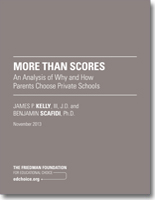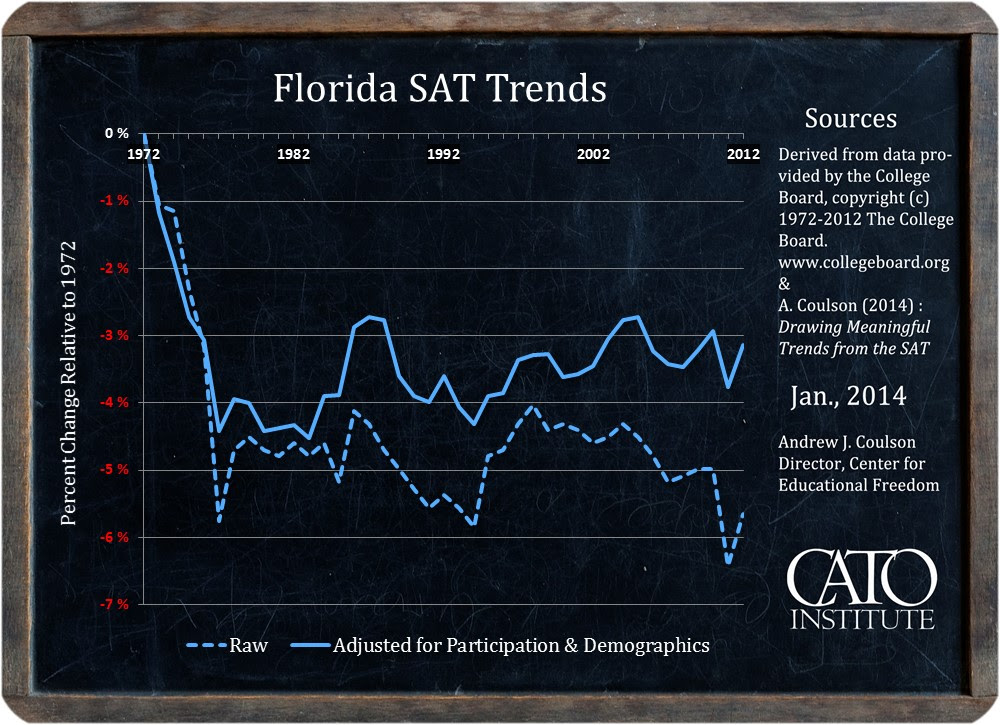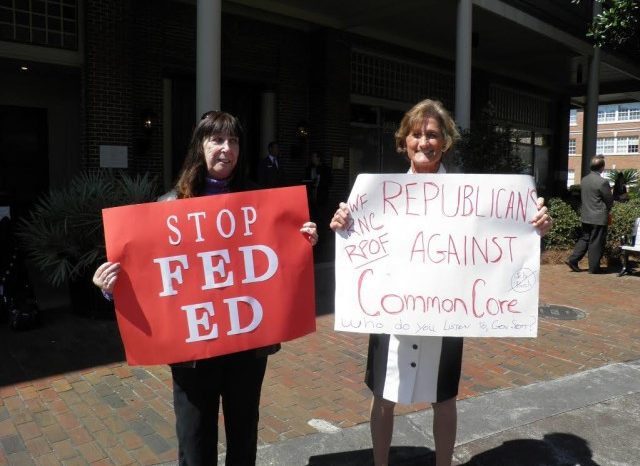
1. Common Core State Standards (CCSS), as an education reform policy, does not satisfy the four pillars of education reform: 1) Accountability 2) More State and Local Control 3) Focusing resources on proven educational methods and 4) Expanded choices for parents. Accountability for implementing the Common Core Standards (that were not properly piloted or vetted) unfairly rests predominantly, and without proper balance, in the hands of the classroom teacher. State of Florida educators were not properly trained in the standards prior to rollout and implementation; State of Florida educators were not asked to provide input during the creation and development of the standards; and State of Florida educators are being forced to implement the Standards without allowances for feedback or changes.
State and local control of education is further removed by Common Core as it cements additional layers of bureaucracy before educational process improvements and timely changes to individual school district student needs can be implemented. Common Core is not focused on proven educational methods as it is not the return to classical education and, in fact, resembles and is more closely aligned with the failed outcome-based education policy. School choice is not an element of Common Core as it has been said on more than one occasion by Florida education legislators and policy experts – Common Core will not cause the proliferation of charter schools, et al. In addition, Common Core has in practicum moved parents further away from the educational process – student learning and caring involvement in their child’s academic needs/strengths.
2. Teachers are in fear of their jobs should they speak out against Common Core. CCSS has created a hostile work environment and a growing mistrust between students, parents, teachers, and administrators. Classroom teachers are held to the highest level of accountability for individual test scores while administrators and superintendents shuffle resources and students around to inflate school grades and school grade improvement statistics. Unjustifiably and unjustly, Florida teachers’ compensation is one of the lowest in the country particularly considering the volume of students (4th in the country).
3. Common Core was not piloted and therefore only exists as a hypothesis and our children are involuntarily being used as processors of non-subject matter experts ideas about their education. These non-experts do not have any vested interest or life connection to the potential failure of such untested standards and therefore will not have to pick up the pieces of frustrated and undereducated (to their potential) students. Common Core is a corporate driven education reform package.
4. All the bandage bills to correct deficiencies in Common Core Standards, while still remaining in the Common Core Consortium and Initiative, are a process of legislative deception; the lack of passing Florida HB25 and SB1316 through Committee for a full House and Senate vote is a form of legislative deception; the Florida Department of Education and Florida legislators receiving, from education foundations, directives regarding the promotion of Common Core prior to and during the 3 state hearings on Common Core, and through this current legislative session, is a process of legislative deception as well as a breach of public trust on the basic principles of fairness and integrity.
5. The numerous bills (bandages) in the FL legislature trying to provide remedy to the documented problems with the development, rollout, and implementation of CCSS indicate just how harmful the standards as developed and copyrighted are and will continue to be.
6. CCSS had a complete lack of transparency during its development and implementation. It was only after public outcry about the lack of parental and education experts input in the development of Common Core that Florida decided to “attempt” to correct the problem by holding 3 supposedly “unbiased” community hearings. The hearings were strictly placebo and an attempt to placate an increasingly hostile parent community. Given the numerous emails sent to the Florida legislative hierarchy and FL Department of Education officials, from special interest groups, one has no option but to conclude that all the players involved in the adoption of CCSS in the State of Florida had a singular lack of respect for parent, teacher, or subject matter expert input.
7. Florida needs to pull out of the RACE TO THE TOP (RTTT) Memorandum of Understanding as it was bribed/coerced to adopt Common Core Standards in order to qualify for federal funds. Florida was rejected as a contender for RTTT funding in Phase I because it did not stipulate accepting CCSS and only progressed to Phase II after accepting Common Core. The “contract” for Common Core was signed prior to final development of Common Core Standards and, as such, the Florida Department of Education and Florida legislators showed a willful disregard, and were quite negligent, to the educational well-being of Florida’s children. “Show me the money” is a phrase best used in film. There are two groups of Americans who sit at the top priority of individuals whose well-being should never be sacrificed for money or profit – the American soldier and the American student. Such callous indifference and disregard for proper process and pedagogical soundness is disturbing.
8. Private schools should not be coerced or blackmailed to adopt Common Core Standards (CCSS) through Common Core’s linkage with the SAT, ACT, and other K-12 testing agents. Private schools have a mission that does not coincide with the mission implicit in CCSS. By and large, the methodology employed by private schools is that students will be treated as individuals and individual learners. Public schools in higher achieving and competitive cities (Example: Boston) have done well by adopting this methodology. Common Core is a step backward towards group thinking and group learning. We respect common minds but we should be ambitious for exemplary minds. Common Core punishes private schools for this decades old philosophy of education and seemingly demands adoption of a less effective teaching curriculum and methodology to match the Common Core standards expectations. Additionally,making adoption of CCSS linear with admissions tests for colleges and universities provides a stranglehold and almost virtually eliminates freedom “of adoption or not” because a variance in even 5% points in a college admissions test can be the difference between getting in a top-tier college or not.
9. There was no input by early childhood experts in the development of Common Core. Such a lack of emphasis on early childhood is as detrimental to education reform as a phony college and career readiness component. Kindergarten readiness is an extremely necessary program of education, particularly in diverse socio-cultural-economic metropolitan areas like Miami Dade, Tampa, and Orlando, were significant challenges arise in kindergarten when such readiness is not achieved.
10. American Institutes for Research (AIR), the chosen education testing/assessment company for Common Core in Florida, is heavily involved in data collection and mining and Florida SB188 does not qualify as a STOP into such intrusion of privacy or a STOP to the potential for a student’s private personal identifiable information being able to be accessed by third party non-education related agents. As such, the ACLU and other agencies are seriously opposed to the data mining and data collection components of Common Core.
11. Both testing companies considered by the Florida Department of Education (FLDOE), the Smarter Balanced Assessment Consortium (SBAC) and AIR, as well as the dismissed PARCC (Partnership for Assessment of Readiness for College and Careers), have requirements that they must share information “across consortia” and with the U.S. Department of Education.
12. CCSS was not state designed, but rather designed by the National Governors Association (NGA), Council of Chief State School Officers (CCSSO), National Center on Education and the Economy (NCEE), Achieve, Inc., West End, and other private special interest organizations via federal and private grants.
The Florida Constitution calls for education policy to be determined in state. Historical education reform research data validates that the most successful and effective programs for higher learning are managed, developed, and implemented with the input of local administrators, education experts, and parents.
13. Mark Tucker, one of the major developers of Common Core, became President of NCEE all the time working for national standards disregarding individual state Constitutions and legislatures. Both Tucker and Lauren Resnick push for national standards based reform. Outcome based education, of which Common Core is but a derivative or reincarnation, has been tried previously and was a pitiful failure.
14. The terminology “cradle to grave” is coined for education and the data collecting of student’s information under the guise of making “positive” changes and process improvements in education. Children’s data is collected and analyzed from cradle to grave. Students’ mistakes become unforgiving in a data controlled business where data analysis is more important than process, individual circumstances, or personal ability. The ends justifies the means is a repeated mantra. The idea of a new generation committed and accepting to data collection and lack of privacy for children is born.
15. The Goals Act of 2000 was a failure, the School-to-Work Opportunities Act was a failure, and the ESEA reauthorization No Child Left Behind was a failure. Education reform must be locally driven to both stop and prevent systematic abuses of children’s individual data, children’s individual mental health, children’s individual social and economic challenges, and children’s individual academic needs. Education reform must be locally driven to assure advances in higher learning and academic achievement, as well as to provide timely assistance to those students with special needs.
16. Florida has failed to provide a security network for protection of children’s data. In an increasingly online education driven learning and teaching environment, extra scrutiny and security must be in place prior to adoption or implementation of any standards/testing of which results and student data could be easily corrupted or breached.
17. Achieve, Inc., a for-profit business formed by the National Governors Association, corporate leaders and Mark Tucker, drove the development and implementation of Common Core. Thusly, a lay person’s and dedicated parent’s assumption would be that Common Core was revenue driven for the benefit of reinvestment in schools, inclusive of continuous teacher training and classroom resource improvements. However, it is not revenue driven for reinvestment in local schools. The priority then becomes the commercialization of schools for profit and benefit of companies and industry and, as such, is an egregious violation of parent, student, and resident trust.
18. Mark Tucker and Judy Codding create America’s Choice. Removing parental input and local school input takes high priority as well as necessity in their reform movement, where local control and influence needs to be drastically reduced and minimized. Uniform control becomes the order of the day vice individual uniqueness. Children are left to the educational mercy of corporate interests (America’s Choice partners with Pearson) and values as it relates to their education.
19. The reauthorization of Elementary and Secondary Education Act (ESEA) into No Child Left Behind was another failed national and centralized education policy that failed to deliver appropriate policy for the diverse and otherwise individual challenges and unique populations of each state, inclusive of child poverty rates. Child poverty is the single most serious problem facing learning and achievement in schools. Common Core is more of the same, or an extension of the same, results driven education drivel that shortchanges both teachers and students in an ever increasing high stakes roulette wheel that has no correlation or acknowledgement to lifelong learning or success. Hitting targets marks and high school grades make administrators happy but is not synonymous to student success.
20. Microsoft contracted with UNESCO for world education by “a master curriculum for teacher training information technologies based standards, guidelines, benchmarks, and assessments.” Corporate business interests disregard the critical fact that a master curriculum violates federal laws as well as State of Florida laws, inclusive of respective Constitutions. In continuation of efforts towards a master curriculum, Bill Gates funds the New Commission on the Skills of the American Workforce, created by Mark Tucker. Prioritizing education commercialization and future company profits becomes the reform “policy of success for education, achievement, and for individual student needs, strengths, and opportunities”. In truth, for-profit interests should have NO place in determining education policy except as an accountable and transparent education reinvestment strategy.
21. Gates plus 2 others create Strong American Schools. Businessmen with no subject matter expertise are determined to decide what is best for American children en masse formula versus an individual formula. While Strong American Schools is non-profit, the policy results are anything but. Such prioritization of profit over individual needs, abilities, and desired skill sets is academic manipulation not for the individual student good but for the greater good of the commercial profiteers.
22. State of Florida SB864 affirming local control of textbooks is incomplete and thus lacking in comprehensive substance inasmuch as we know that the State of Florida, and their school districts, purchased, and obtained respectively, their CCSS aligned textbooks prior to the effective date of 2014-2015, as rollout and implementation had already commenced. What allowances, both fiscally and administratively, have been made for previously purchased and obtained CCSS aligned fallacious textbooks?
23. Florida decided to adopt CCSS prior to the standards being completely written. Florida signed over the academic lives of children without knowledge of the content or quality of the standards. Such negligence must stop and never be repeated. Continuing to implement Common Core sets a dangerous precedent of neglectful behavior towards securing the educational protection and betterment of children.
24. Florida parents, teachers, and administrators were ignored in the process of developing and implementing Common Core. Process does matter and the means for obtaining the highest quality of standards for Florida students has never been fully investigated. 3 hearings organized simply to “correct” the mess that is CCSS does not qualify as sincerity by the Florida Department of Education or Florida Legislature to develop and implement the highest quality of standards SPECIFIC to Florida’s student needs, diversity, and academic abilities. Florida has 6 of the top 12 largest school districts in the country. Such volume demands thorough investigation and input by the vast array of individuals within the state committed and qualified to give testimony regarding education, curriculum, instruction,standards, and careers. The State of Florida Department of Education and Florida Legislature should have been aggressive in seeking out these experts when considering reform instead of “you can come to a hearing or provide website comment” if you are concerned about Common Core. I find this methodology of reform and engagement of experts to be woefully incompetent and lacking in sincere intent for the creation of the very best standards Florida can offer.
25. Professors from a diverse group of colleges and universities have risen up in opposition to Common Core Standards. They include, but are not exclusive to – Dr. Anthony Esolen (Providence College), Dr. Thomas Newkirk (University of New Hampshire), Dr. Daniel Coupland (Hillsdale College), Dr.Christopher Tienken (Seton Hall University), Dr. James Milgram (Stanford University), Dr. Sandra Stotsky (University of Arkansas), Dr. Alan Manning (Brigham Young University), Dr. Bill Evers (Hoover Institute at Stanford University), Dr. Terence Moore (Hillsdale College), Dr. William Mathis (University of Colorado, et al.
26. The Family Education Rights and Privacy Act (FERPA) is weakened as a result of Common Core, therein seriously damaging the protection of student information and data. FERPA’s collusion with Common Core further decimates parental rights and harms children as a result of parental non-involvement. FERPA’s removal of the requirement for parental permission before any data is collected or transmitted regarding children is dangerous. The Electronic Privacy Information Center (EPIC) is suing the U.S. Department of Education because of the weakening of FERPA and the loss of privacy as a result thereof.
27. Some states data collection starts when a child is 24 hours old – hence the Common Core used terminology “cradle to grave”.
28. Common Core is of mediocre quality and will not result in greater student learning as per the analysis of the #1 Think Tank in the world, Brookings Institute (Brown Center for Education Policy).
29. Common Core threatens, coerces, and puts undue pressure and duress on private, religious, and homeschooling because of the stranglehold CCSS has on linear assessments, particularly the SAT/ACT and other college admissions requirements. Private, religious, and homeschooling students have traditionally scored higher in standardized tests and have higher percentages of student graduation rates and college admissions. A consortium of Florida education experts from these 3 areas of schooling, as well as their public school counterparts, will do much more for student learning and success than any Common Core hypothesis.
30. Common Core provides no process for ongoing teacher feedback and hence lacks a mechanism for process improvement in a timely and efficient manner.
31. A small group of paid experts created Common Core standards with the philosophy “Corporate Interest Knows Best” versus local school and parent know best.
32. Common Core was never pilot tested in any school or school district. Such failure re-emphasizes that the priority was given to commercialization and/or special interests instead of validated and proven student learning techniques.
33. Common Core puts an unequal emphasis on education as being solely for workforce training. (My professor father would have such loud opposition to such emphasis.)
34. Teacher evaluations being tied to federal mandates represent a gross ignorance by the Common Core developers of the uniqueness and challenges of local populations – particularly in the areas of diversity, cultural needs, language, and poverty. Teacher accountability standards should be determined at the state level.
35. Common Core disregards local child poverty programs and does nothing to discuss/resolve the linkage between poverty and academic underachievement. Consequently, even if it was education’s “eureka” moment, it is incomplete.
36. Common Core seems to be more a campaign by millionaires and billionaires to achieve short and long-term company profit goals than a reform program prioritizing the maximization of individual achievement. Measurement and data seem to be at the top of the new paradigm for education.
37. Common Core has no component for educational supplemental services such as high-quality preschools, expanded summer school, and after school resources.
38. Common Core fails to deliver a transparent and comprehensive strategic plan to make every student college and career ready. (Probably because it is a completely bogus component and only used for propaganda purposes.)
39. Common Core developers, as well as the State of Florida, presented no cost analysis prior to approval of adoption and implementation of Common Core Standards. There is a major concern that such negligence for funding, especially given the anticipated dramatic increase in funding needed, will be another issue that interferes with student outcomes and performance. Common Core’s lack of cost analysis is sure to lead to revenue shortfalls and eventual CCSS implementation failure as schools struggle for funding. Uncertain funding will surely lead to some program shortages. Uncertain funding will surely lead away from learning as a priority and towards funding as a priority. As any parent that runs a household knows, it is hard to think about tomorrow’s “lesson” when you are trying to provide nourishment for today’s “lesson”.
40. CCSS is nothing visionary, but rather the opinions of a few, and a desire by some, to be the next visionaries and founders of education’s “Eureka moment”.
41. Standards should never be moved away from educators, schools, and parents then given to distant bureaucracies and politicians or special interest groups or companies.
42. Any potential positive of Common Core was completely undermined by bad process. Political agenda, quid pro quo practices, favor giving, and commercial interests should never take precedence over student protection and respect, or teacher protection and respect.
43. Common Core aligned textbooks and worksheets have been proven to be flawed. Teacher training for the implementation of Common Core has been proven to be flawed. Funding equity and resources per school has been proven to be flawed. (Example: If school district schools are allotted $ equally, but yet one school only employs one security guard while another has to employ four, are they both getting equal $ for classroom instruction?). Common Core does nothing but institute more flaws inan already flawed system. This is what the Florida legislature calls quality education reform? Common Core is not a problem solver, Common Core is a problem maker.
44. There are states that adopted Common Core even though they are recognized to have had higher standards than Common Core. (Minnesota and Massachusetts by way of example) Why force, through stranglehold federal government monetary incentives and mandates, states to lower their standards? Such coercion speaks to the lack of sincerity in truly delivering higher learning for all. Rather it speaks to COMMON curriculum and standards regardless of individual student needs and abilities. Rather it speaks to corporate interests vice community/student interests being a priority.
45. Common Core once claimed to be internationally benchmarked as a public relations selling point, but the CCSS website no longer uses that terminology as it was a total fabrication (lie). Rather, it now states CCSS “is informed by the standards of other countries”. What exactly does that mean – informed by?
46. Common Core does not necessarily help students who transfer from other states as there is no proven data to suggest the standards’ “uniformity” will help the students. In other words, are the classes and curriculum going to be taught in the same sequence, at the same time, with the same teacher energy and expertise? It is nonsensical to suggest transient students will benefit from such a “uniformity” of standards. No classroom teacher or administrator would stipulate such guaranteed benefit. There are too many ingredients/variables in student academic success to even suggest that national standards would even remotely be the “end all” of higher learning. It might play a part in better testing (eventually), but philosophically and theoretically cannot play a realistic part in higher learning.
47. Less than 4% of the student population moves from state-to-state therefore any promotion of the idea that Common Core benefits moving students puts the other 96% of the student population in jeopardy. Both are hypotheticals much like the standards themselves.
48. Ethan Young, a high school student, has given a first-hand account of the problems with Common Core. He should be listened to as many student accounts are now coming in as a result of states implementing CCSS and first person testimony finally being readily available. The mathematics standards are of lower quality and the English Language Arts standards, particularly the informational texts, used as a priority in high school, is manipulative/subjective as well as not of pedagogical soundness. If the informational text is geared towards college and career readiness, how do you determine student interests and talents? It appears as if career “interests” will be pre-determined. That is offensive to individuality and personal skills. Filling slots in workforce shortages was never and should never be the pre-eminent intent of education.
49. High stakes testing is wrong for students and teachers and puts a grotesque priority/emphasis on grading/results versus learning and innovation. Think Einstein.
50. Common Core appears to be a power grab by private non-governmental institutions not answerable to parents.
51. Common Core institutes a feeling in parents (apparently true) that they are being ignored and that they should have little to no control over their children’s education.
52. Common Core Standards are not owned by the State of Florida, and even though the FLDOE and the Florida legislature are calling CCSS by its new name Next Generation Sunshine State Standards or Florida Standards, all the while violating its own renewed commitment to transparency and ethics, Florida still remains in the Common Core Consortium and Initiative, and still has agreed to adopt Common Core State Standards. Such duplicity has no place in constituent communication much less student education.
53. The British education system showed a marked decrease in academic achievement after adopting Common Core-like standards. If they are the pilot for Common Core, we should take notice.
54. The negative impact of one-size-fits-all-standards is expected to be irreversible for at least one generation. Even one generation being impacted negatively is unacceptable.
55. Parents should decide, in combination with their local communities and education leaders, the best education policy and reform for their children.
56. Parental input for educational process improvement was decimated during Common Core development and is continuing to be decimated during implementation. Common Core limits parental voice in their child’s education.
57. Teachers are given little control over their classroom. Common Core Standards will impose a strict regimen of compliance, whether effective for each individual student or not.
58. Teacher evaluation and pay is tied to student performance regardless of challenges in diversity, poverty, language, or disability. Teachers are in effect forced to participate in a merit/accountability system that has triggers more for the benefit of administrators and education vigilantes than students.
59. Common Core will hurt students as it is a one-size-fits-all education norm that assumes students all learn in the same way (what a gross travesty of reasoning) and gives no variance/allowance for individual student styles, preferences, and paces.
60. The Race to the Top Memorandum of Understanding absolutely requires data mining of a student’s personal identifiable information. The information collected is more than test scores and academic progress (parent political party affiliation, religion, marital status, etc. could be collected). In Florida, parents have testified they feel coerced into “voluntarily” granting, signing on the dotted line, permission to transfer such personal information as part of the requirements to have their children’s assessment scores sent to award agencies and/or colleges and universities, as well as participating in the race to receive scholarships and grants.
61. Sandra Stotsky, Professor at the University of Arkansas, and a member of the validation committee for Common Core, says Common Core dumbs down students at least two grades levels.
62. Centralized education systems have a long history of not working and never will work as diversity and poverty, two areas which impact both student curriculum needs and learning ability, cannot be administered effectively, i.e. personally and individually, by remote control.
63. 300 prominent policy makers and education experts warn that Common Core will close the door on innovation.
64. Common Core will drive curriculum, a fact which was admitted by both the U.S. Department of Education and Mark Tucker. As we know, there is no best design for curriculum sequences in any subject. Therefore, it is then highly questionable, given the diversity of adolescent’s interests, talents, and educational needs, that CCSS and its curriculum will be not be effective given its lack of understanding of the local population and their needs, which are necessary in order to effectively maximize student learning and achievement (scholars admit and understand learning and achievement are not necessarily the same).
65. Common Core Standards are of insufficient quality to be deemed a “national” standard.
66. Alaska, Nebraska, Texas, and Virginia refused to adopt Common Core. Did anyone ask them their reasoning? As such, because of their non-involvement, we cannot possibly have national standards, thereby negating any of the propagandistic elements used by Common Core’s developers in support of the benefits of national standards.
67. Education administrators in Florida, educators in Florida, and parents in Florida did not hear about Common Core until after the FL State Board of Education had already adopted them. The members of the Florida Department of Education board decided to adopt Common Core prior to comprehensively consulting lawmakers, education administrators, educators, education subject matter experts and parents. Being on the FL State Board of Education should be more than a ceremonial job offered to “favored colleagues”. Being on the FL State Board of Education should be more than a job” politik”.
68. Some members of Florida legislature have circled the wagons, protected special interests, made decisions based on future jobs or careers, and aggressively circumvented the legislative process and responsibility, by not bringing HB25 and SB1316 up for a full House and Senate vote.
69. All attempts to “play” quid pro quo politics, favor giving politics, and self-aggrandizement politics must be eliminated particularly in the education of our children K-12.
70. Education standards are not curriculum but they do determine what children will and will not learn. They define curriculum. In the State of Florida, curriculum must be state driven.
71. No state, Florida included, has analyzed how much the upgrade in technology for only online-testing will cost or know how effective it will be. What happens with audio learners or special needs students? What happens with testing security and computer malfunctions? Is Florida ready or is there a rush to implementation? One student testified that online tests are already being given. As a Magnet high school student in an International Baccalaureate Program, she had a situation where a computer malfunctioned during a timed test resulting in her having to start all over. She was almost in tears as not only did she have to restart and then finish per the time guidelines, but any ability to re-check her work was impossible given the set-up procedures for online testing.
72. Common Core ruins simple addition and subtraction by complicating easy problems. In subtraction it forces students to visualize columns. Supposedly, such “dissecting” helps with analytical skills. The truth of that statement is unknown. What is known is that a very small group of people got together and decided that “theorectically” the math standards by Common Core should prove to improve analytical skills. Apparently, it was only proven to not improve theirs.
73. A key Common Core creator, Jason Zimba, said that Common Core can prepare students for non-selective colleges but that it does not prepare students for STEM careers. He said “I think it is an unfair critique that it is a minimal definition of college readiness. . . but it’s not for the colleges most parents aspire to . . . not only not for STEM, it is also not for selective colleges. For example, for U.C. Berkeley, whether you are going to be an engineer or not, you’d better have pre-calculus to get into U.C. Berkeley.”
74. Do the Common Core Standards improve K-12 education? No one knows because, once again, Common Core was unpiloted and untested. As such it continues to be a hypothesis in word and in practicum.
75. Dr. James Milgram (Stanford University emeritus professor who served on the Common Core validation committee) said this about Common Core, “I can tell you that my main objection to Core Standards and the reason I did not sign off on them was that they did not match up to international expectations. They were at least two years behind the practices of the high achieving countries by 7th grade, and, as a number of people have observed, only require partial understanding of what would be the content of a normal, solid, course in Algebra 1 or geometry. Moreover, they deliver very little of the context of Algebra II, and none of any higher level course. . . They will not help our children match up to the students in the top foreign countries when it comes to being hired to top level jobs.”
76. Dr. Sandra Stotsky (previously mentioned as being on the validation committee and who refused to sign off on the English Language Arts standards) also had this to say about Common Core.“As empty skill sets, Common Core’s ELA standards do not strengthen the high school curriculum. Nor can they reduce post-secondary remedial coursework in a legitimate way. As empty skill sets, Common Core’s ELA “college and career readiness” standards weaken the base of literacy and cultural knowledge needed for authentic college coursework, decrease the capacity for analytical thinking. . ; and completely muddle the development of writing skills.” Common Core will not solve the English remediation problem currently existing for incoming college freshman.
77. The General Education Provisions Act (GEPA) wisely prohibits the federal government from directing education – very clearly.
“No provision of any applicable program shall be construed to authorize any department, agency, officer, or employee of the United States to exercise any direction, supervision, or control over the curriculum, program of instruction, administration, or personnel of any educational institution, school, or school system, or over the selection of library resources, textbooks, or other printed or published instructional materials by an educational institution or school system.”
78. The emphasis in English Language Arts on informational text – 4th grade splits Literacy and Informational 50/50; 8th grade splits Literacy and Informational 45/55; 12th grade splits Literacy and Informational 30/70 – is not advantageous to literacy and vocabulary building sequencing. Informational text can be in the form of scientific writings, political writings, opinion pieces, or anything other than classic novels, poetry, plays, or other fictional works. Such an emphasis on informational text damages unnecessarily literacy as the needed priority in reading and writing development.
79. Common Core falsely advertises itself as more rigorous. Nothing can be further from the truth especially in the math standards. The National Center for Education and Economy (NCEE), one of the advisors and/or writers of CCSS, stated quite clearly that high math standards were not necessary in high school.
80. The federal EDFacts Exchange collects data for local, state, and federal levels. The federal government paid for states to build matching and interoperable State Longitudinal Database Systems. The U.S. Department of Education is listed as a partner of the Education Information Management Advisory Consortia (EIMAC) which does data collection of students and does promise to share biological and behavioral data.
81. 132 professors of Catholic universities wrote a letter denouncing Common Core on both academic and moral grounds.
82. Regardless of any legislation passed by the Florida legislature regarding data privacy, the stakeholders in Common Core have orchestrated state school systems to “voluntarily” agree to common data core standards to make data comparisons easy. They do not care about the content of the standards, rather they care that the comparisons are easily documented and created into workable data, and are using CCSS as an accessory. The CEO of Escholar Shawn Bay spoke at an event called Datapalooza and stated that Common Core “Is the glue that actually ties everything together” for student data collection. Cradle to grave mentality is not just theory but a collusion between companies and government – placing children as subjects of data trafficking and worse. The buying and selling of data is a multi-billion dollar business.
83. Common Core manages teachers through intimidation. Common Core will effectively discourage individuals from seeking a career in teaching. (How is that for college and career readiness?!) The increase in testing days demotivates teachers, abnormally stresses students, and puts an undue burden on “quick” instruction and the ever dreaded “teaching to the test”.
84. Ze’ev Wurman (formerly a U.S. Department of Education official and currently a Professor of Mathematics at Johns Hopkins University) contends that Common Core math standards are not as promised. Example: As compared to California and Minnesota, who have higher math standards, Common Core is more numerous. Minnesota has 42 pages of standards; California has 59 pages of standards; meanwhile Common Core has 73 pages of standards. More standards are not necessary or efficient for higher achievement.
85. The National Mathematics Advisory Panel, Foundations of Success, called for fluency in addition and subtraction of whole numbers by the end of 3rd grade, and fluency in multiplication and division by end of 5th grade. California has the same fluency standards. However, high math achieving countries like Singapore and Korea, Japan and Hong Kong, call for multiplication and division of whole numbers even earlier or by 4th grade. However, Common Core refers fluency to 6th grade proving that Common Core’s math standards are not more rigorous.
86. Andrew Porter, Dean of the University of Pennsylvania’s Graduate School of Education, recently evaluated the Common Core Standards with his colleagues and their conclusion was negative towards CCSS. “Those that hope that the Common Core Standards represent greater focus for U.S. education will be disappointed by our answers. Only one of our criteria measuring focus found that the Common Core standards are more focused than current state standards. . . We also evaluated international benchmarking to judge the quality of the Common Core standards. High performing countries’ emphasis on “perform procedures” runs counter to the widespread call in the US for greater emphasis on higher-order cognitive demand.”
87. The End of the Math Wars is nowhere in sight. Professor William McCallum, one of the 3 main writers of the Common Core mathematics standards said this when speaking at an annual conference of mathematics societies. While acknowledging the concerns about front loading demands in early grades, McCallum said “the overall standards would not be too high, certainly not in comparison with other nations, including East Asia, where math education excels.
88. College readiness is defined by what colleges require as prerequisites for incoming freshman. Overwhelmingly, the enrollment requirements of four-year state colleges consist of at least 3 years of high school mathematics including Algebra I & II (and geometry) – including such elements contained therein as complex numbers, vectors, trigonometry, bionomical theorem, logarithms, logarithmic and exponential functions, ellipse, etc. Common Core Standards do not include these elements and therefore cannot lay honest claim to “college readiness”.
89. Common Core mathematics standards fail on rigor and clarity in comparison to better state standards and those of higher achieving countries.
90. The Florida Department of Education’s testing company American Institutes for Research (AIR) is the same as Smarter Balanced Assessment Consortium (SBAC) – as AIR is developing the test for SBAC. AIR is controversial as it involves itself in mental health analysis without having any subject matter expertise in health.
91. The National PTA (Parent Teachers Association) and the U.S. Chamber of Commerce have been, as it appears, to be effectively bribed, through million dollar donations, to not only support Common Core but to propagandize it publicly. The unfortunate exchange of money between the creators/developers of Common Core and self-promoting agencies is a violation of consumer trust and seemingly a corrupt manipulation of the very purpose/mission of any program or policy that affects our nation’s children.
92. Career readiness as a component of Common Core can only be an advertising moniker because there is absolutely no way for academic standards to determine student interests and talents other than in general/common requirement terms and, as such, are not exclusive or unique to Common Core. In the alternative, is Common Core a methodology to force students into fields for which they have no or very little interest but will nonetheless fulfill commercial workforce interests vice student learning interests?
93. Where is the strategic plan for assuring career readiness? Is career readiness going to be determined by college graduation rates? Is career readiness going to be determined by school-to-work programs? We know that traditional colleges have a graduate employment rate (measured by a graduate being employed within 6 months of graduation) at less than 30%; we know that career colleges can have a graduate employment rate of up to 80%. Are Common Core Standards geared to the encouragement of increasing the participation of our student population in career colleges vice traditional colleges? If it is career colleges, do students benefit from the implementation and assessments of Common Core Standards and are they necessary for career college success? Historical data would show that career colleges are not influenced and will not be influenced by these “career readiness” standards. Therefore, who is the target market? WE DO NOT KNOW. What we do know is who owns the profit market.
94. Special need students have been largely ignored in the development and implementation of Common Core. Despite bandage bills in the Florida legislature attempting to remedy this gross oversight, Florida public school students of special needs, and the teachers that are working their hardest to integrate them into the student population while still developing/implementing an Individualized Education Plan, will suffer unnecessarily by this oversight.
95. Ultimately, Common Core is harmful to family structures as “it takes away power from parents, and de-incentivizes parents from a deep and abiding interest in their child’s education”. Education is lifelong; Education begins and ends at home.























